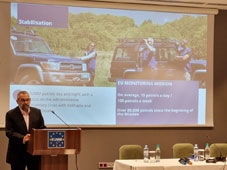
EU Monitoring Mission to Stay in Georgia as Long as Necessary, Says Dimitrios Karabalis
By Liza Mchedlidze
Monday, October 2, 2023
The EU Monitoring Mission has concluded its 15 years of operations, and on October 1st, the head of the mission, Dimitrios Karabalis, held a press conference.
Karabalis mentioned that exactly 15 years ago, on October 1st, more than 200 EUMM monitors began patrolling in Georgia following the August 2008 war and EUMM monitors have patrolled ever since contributing to stability, security, and lasting peace in Georgia.
According to Karabalis, "For a decade and a half, the EUMM has played a pivotal role in ensuring stability and reducing tensions in Georgia and the wider region. Our presence over the past 15 years stands as a testament to the EU's long-term commitment to fostering peace and security."
"The European Union's long-term commitment to peaceful conflict resolution in Georgia and the wider region was also clearly underscored by the EU High Representative for Foreign Affairs and Security Policy, Mr. Josep Borrell, who visited Georgia in September," the Head of EUMM said.
Mr. Karabalis highlighted that since 2008, more than 86.000 patrols helped make Georgia more stable and safer for the local population.
"Nearly 600 days ago, Russia launched an unprovoked and unjustified full-scale invasion of Ukraine. Although the war has many implications on the security environment in Georgia, we have so far not observed any significant deterioration of the security situation along the Administrative Boundary Lines (ABLs). However, the situation remains fragile, and we should not take this relative stability for granted, as there is always some potential for adverse development. Things can change quickly as we have recently seen in neighbouring countries," said Mr. Karabalis.
"We remain dedicated to our mission of improving the lives and security of local communities. We will stay in Georgia as long as necessary," Karabalis stated.
The head of the European Union Monitoring Mission, emphasized the importance of understanding the European Union's decision-making process while speaking to reporters. He pointed out that the European Union consists of 27 member states, each of which retains its sovereign authority to make decisions. The European Union operates on a consensus-based approach, and decisions are not imposed through decrees or unilateral actions.
Karabalis clarified that when it comes to granting candidate status for EU membership, it is a collective decision made by all 27 member states. This decision-making process reflects the cooperative nature of the European Union.
Regarding the question of whether obtaining candidate status would facilitate Georgia's efforts in peaceful conflict resolution, Karabalis noted that the resolution of conflicts is a complex issue that does not solely depend on the EU monitoring mission. However, he emphasized that the mission's primary objective is to create a conducive environment that encourages all parties involved to engage in dialogue and negotiation at the negotiation table.

